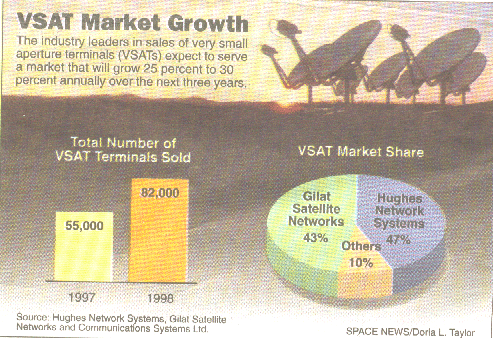
Gilat to Follow Hughes into Services Sector
By PETER B. de SELDING

Space News Staff Writer
GENEVA - The market leaders in the sale of private satellite networks are expanding their target customer base to sustain the robust annual growth seen in recent years.
Hughes Network Systems (HNS), Germantown, Md., and Gilat Satellite Networks, Petah Tikva, Israel, already sell the vast majority of the satellite equipment that many large international corporations, such as the U.S. department store chain WalMart Stores Inc., use to connect branch offices and retail outlets.
While the demand for private satellite networks among large corporations remains healthy, FINS and Gilat are moving downstream into a wider marketplace, where the buyers are small companies, schools and individuals.
For HNS, the effort is part of a broader effort by its corporate parent, Los Angeles based Hughes Electronics Corp., to offer high-speed Internet access to small businesses.
Hughes! planned Spaceway satellite system, for example, will use a few satellites in . high geostationary orbit to provide broadband Internet, connections, to the owners of small rooltop satellite dishes.
Spaceway in expected to be launched early in the next decade.
In the meantime, HNS is launching DirecWay Multimedia VSAT (very small aperture terminal), which is intended to be a forerunner to the more capable Spaceway system.
Pradman P. Kaul, HNS president and chief operating officer, said during the Telecom ~ 99 exhibition here that the DirecWlay system offers consumers access to the Internet, electronic mail and television programs with a single box attached to a viewer's television set. .
HNS also, announced the creation of HNS Europe to raise its profile in the booming European VSAT market, where growth la being fueled by deregulation of satellite services.
. Gilat, an Independent company that does not have an in-house satellite systems' affiliate like Hughes, appears to have adopted a similar strategy.
Gidi Talmor, vice president of marketing for Gilat Europe, said in an interview that the company will increasingly focus its attention on pro"ding services using VSATs rather than just the VSAT hardware.
Part of the service offering, Talmor said, will be delivering multimedia access to individual personal computers. Gilat officials declined to say more about the service, or possible teaming arrangements with companies planning to offer broadband services via satellite.
J. Armand Musey, senior satellite analyst at Banc of America Securities in New York, said in an Oct. 18 note to clients that possible broadband partners for Gilat include Loral Cyberstar of Rockville, Md.; Microsoft of Redmond, Wash.; or the New York-based NBC television network.
"With its first-class manufacturing capabilities and large established corporate client base, Gilat la a desired partner by al most every one of the potential- broadband providers," Musey said.
HNS and Gilat both have robust existing businesses selling VSATs,-.the basic hardware for private satellite networks.
Simon Bull, a senior consultant at Communications Systems Ltd. of St. Albans, England, known as Comsys, said that the two companies combined have more than 80 percent of the market for sales of VSATs.
While that market remains relatively small, itIs growing fast. In 1997, Comsys estimates that 55,000 two-way VSATs were sold worldwide.
More than 82,000 were sold in 1998, and Bull said a 25 percent annual- growth rate W the coming years is a realistic objective.
Bull said HNS has a distinct advantage over Gilat because of the connection with Spaceway and Hughes' DirecTV direct-to-home satellite television venture.
Bull said HNS has a distinct advantage over Gilat because of the connection with Spaceway and Hughes' DirecTV direct-to-home satellite television venture.
Kaul said FINS expects to, build more than 2 million DirecTV set-top television boxes in 1999, a big factor in the company's expected $1.3 billion in 1999 sales.
VSAT sales, including terminals and associated services, are expected to surpass $750 million in 1999, a 20 percent increase over 1998, Kaul said.
The story in Europe is even more positive. Roberto Campitelli, president of Rome based HNS Europe, said the European operation will post more than $140 million in revenue in 1999, and that the market is growing by more than 30 percent annually.
Gilat's Talmor said the company has high hopes for its partnership with ZapMe! Corp. of Sàn Ramon, Calif., and AccentHealth of Tampa ' Fla., which together are expected to install 10,000 Gilat SkyBlaster interactive terminals for broadband video and data transmissions using the Internet Protocol transmission standard.
ZapMe! expects to install Internet-linked personal computers in 6,000 U.S. schools in 2000 for Internet training classes. The company expects advertisers targeting student-age consumers to finance the operation.
AccentHealth is using Gilat terminals to beam advertiser-sponsored television programming into doctors' waiting rooms.
"Both these applications are much less expensive than purchasing CD-ROMs," Talmor said.
"And both are going after captive audiences with tailored advertising."